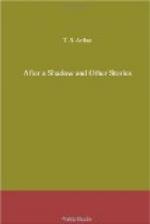Wealth gave Mrs. Caldwell leisure for ease and luxurious self-indulgence, and she accepted the privileges of her condition. Some minds, when not under the spur, sink naturally into, a state of inertia, from which, when any touch of the spur reaches them, they spring up with signs of fretfulness. The wife and mother, no matter what her condition, who yields to this inertia, cannot escape the spur. Children and servant, excepting all other causes, will not spare the pricking heel.
Mrs. Caldwell was, by nature, a kind-hearted woman, and not lacking in good sense. But for the misfortune of having a rich husband, she might have spent an active, useful, happy life. It was the opportunity which abundance gave for idleness and ease that marred everything. Order in a household, and discipline among children, do not come spontaneously. They are the result of wise forecast, and patient, untiring, never-relaxing effort. A mere conviction of duty is rarely found to be sufficient incentive; there must be the impelling force of some strong-handed necessity. In the case of Mrs. Caldwell, this did not exist; and so she failed in the creation of that order in her family without which permanent tranquillity is impossible. In all lives are instructive episodes, and interesting as instructive. Let us take one of them from the life of this lady, whose chief misfortune was in being rich.
Mrs. Caldwell’s brow was clouded. It was never, for a very long time, free from, clouds, for it seemed as if all sources of worry and vexation were on the increase; and, to make matters worse, patience was assuredly on the decline. Little things, once scarcely observed, now give sharp annoyance, there being rarely any discrimination and whether they were of accident, neglect, or wilfulness.
“Phoebe!” she called, fretfully.
The voice of her daughter answered, half-indifferently, from the next room.
“Why don’t you come when I call you?” Anger now mingled with fretfulness.
The face of a girl in her seventeenth year, on which sat no very amiable expression, was presented at the door.
“Is that your opera cloak lying across the chair, and partly on the floor?”
Phoebe, without answering, crossed the room, and catching up the garment with as little carefulness as if it had been an old shawl threw it across her arm, and was retiring, when her mother said, sharply,—
“Just see how you are rumpling that cloak! What do you mean?”
“I’m not hurting the cloak, mother,” answered Phoebe, coolly. Then, with a shade of reproof, she added, “You fret yourself for nothing.”
“Do you call it nothing to abuse an elegant garment like that?” demanded Mrs. Caldwell. “To throw it upon the floor, and tumble it about as if it were an old rag?”
“All of which, mother mine, I have not done.” And the girl tossed her head with an air of light indifference.




